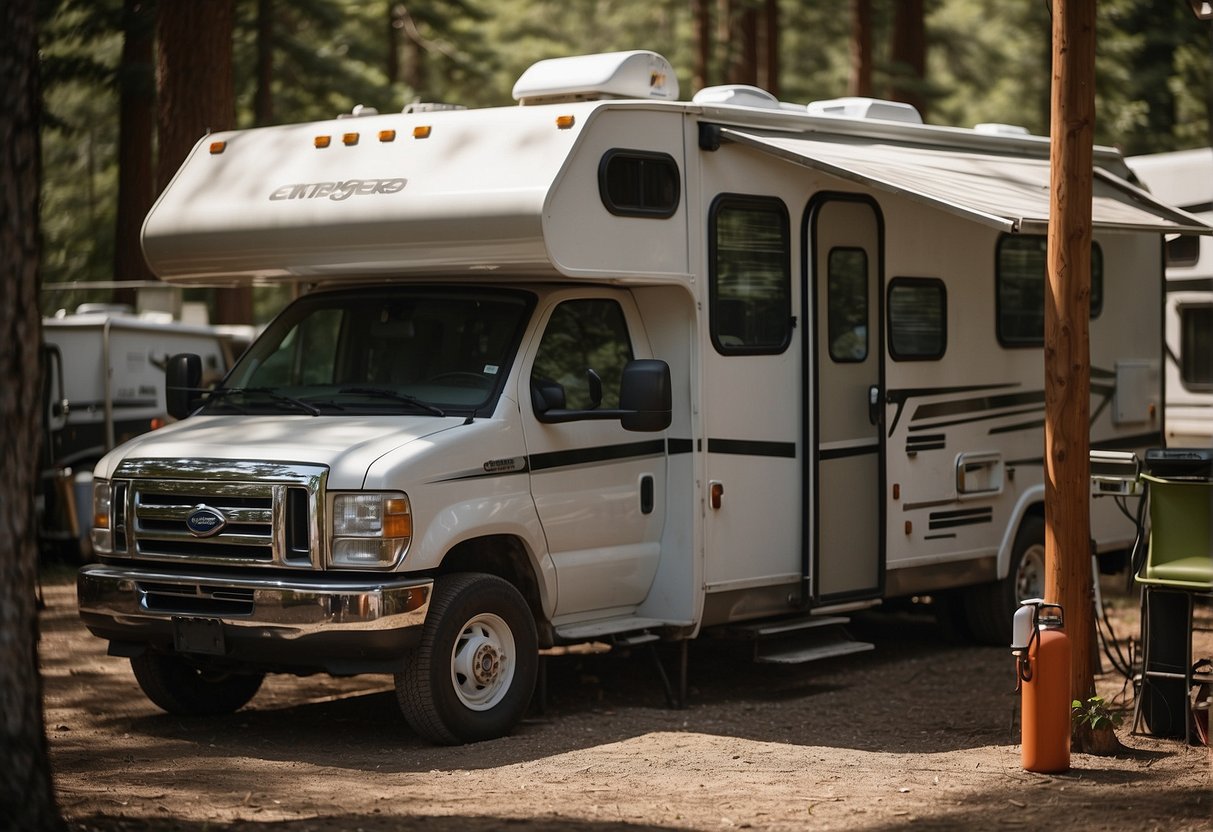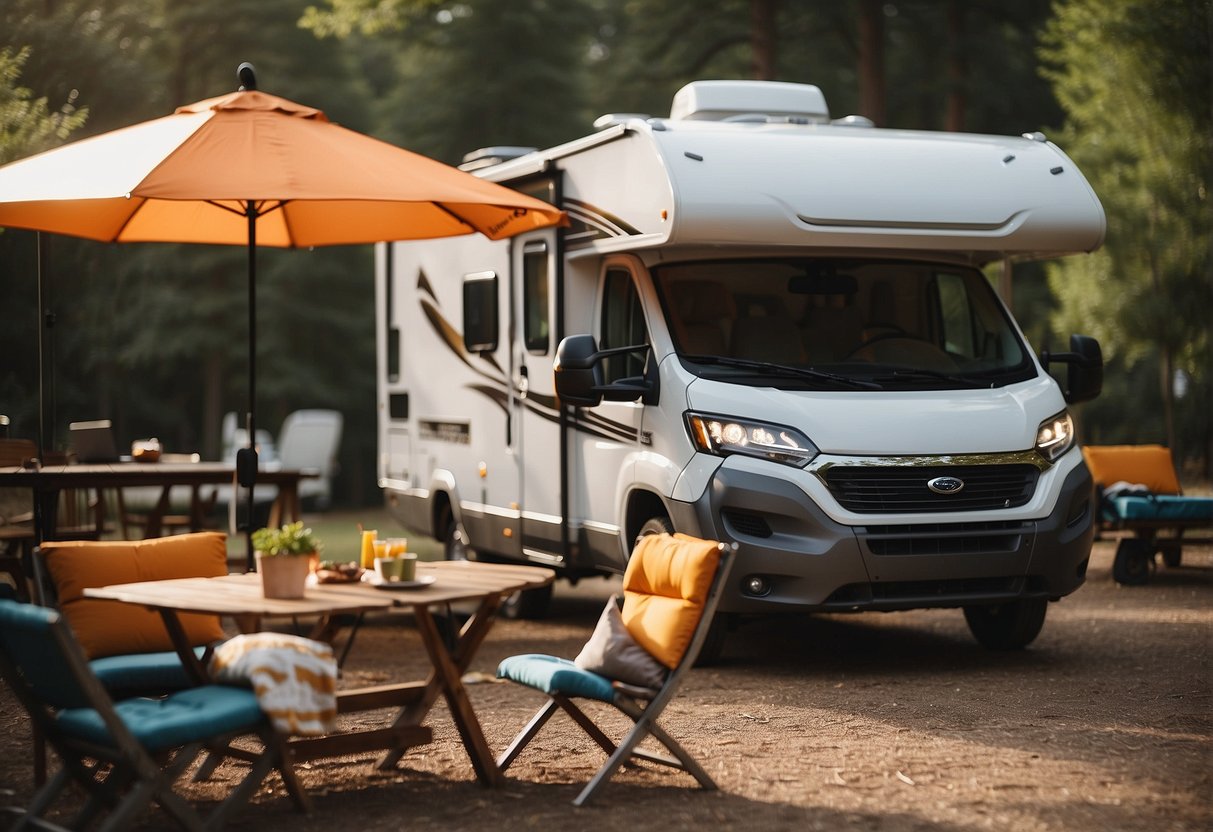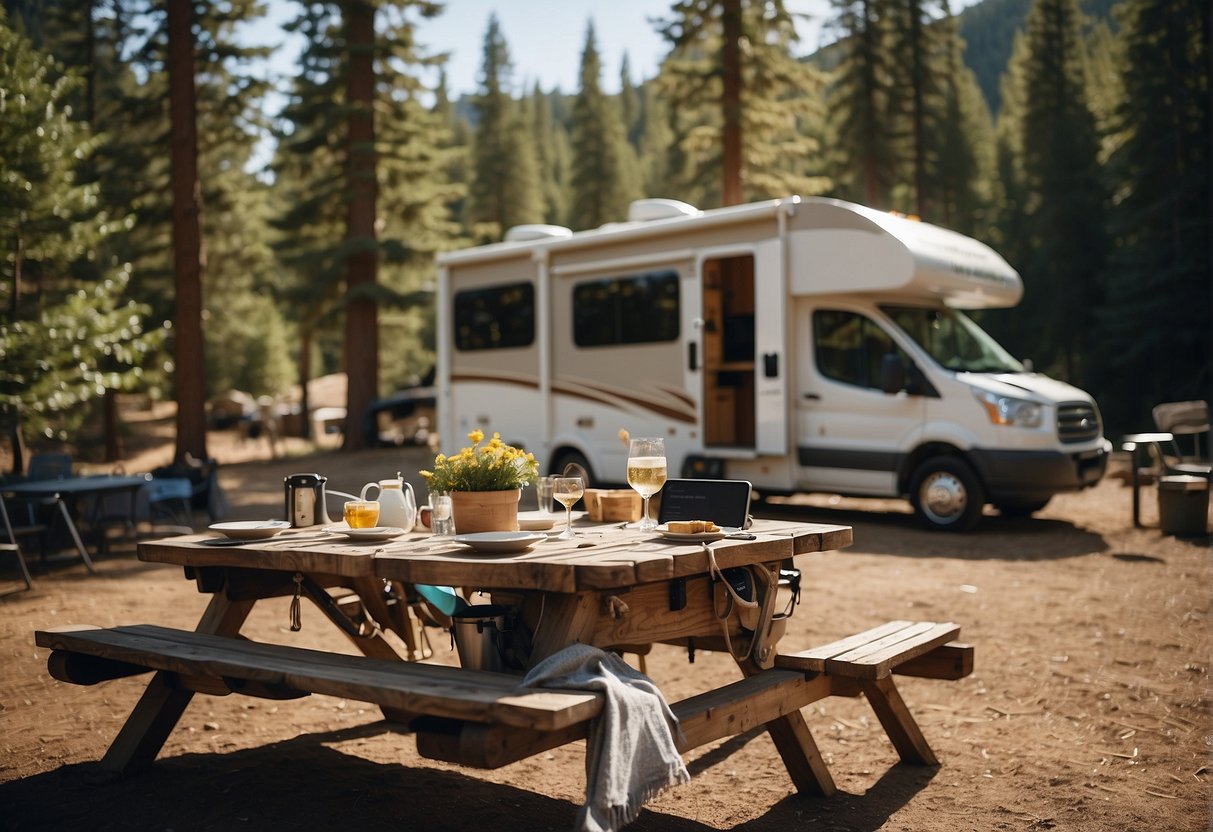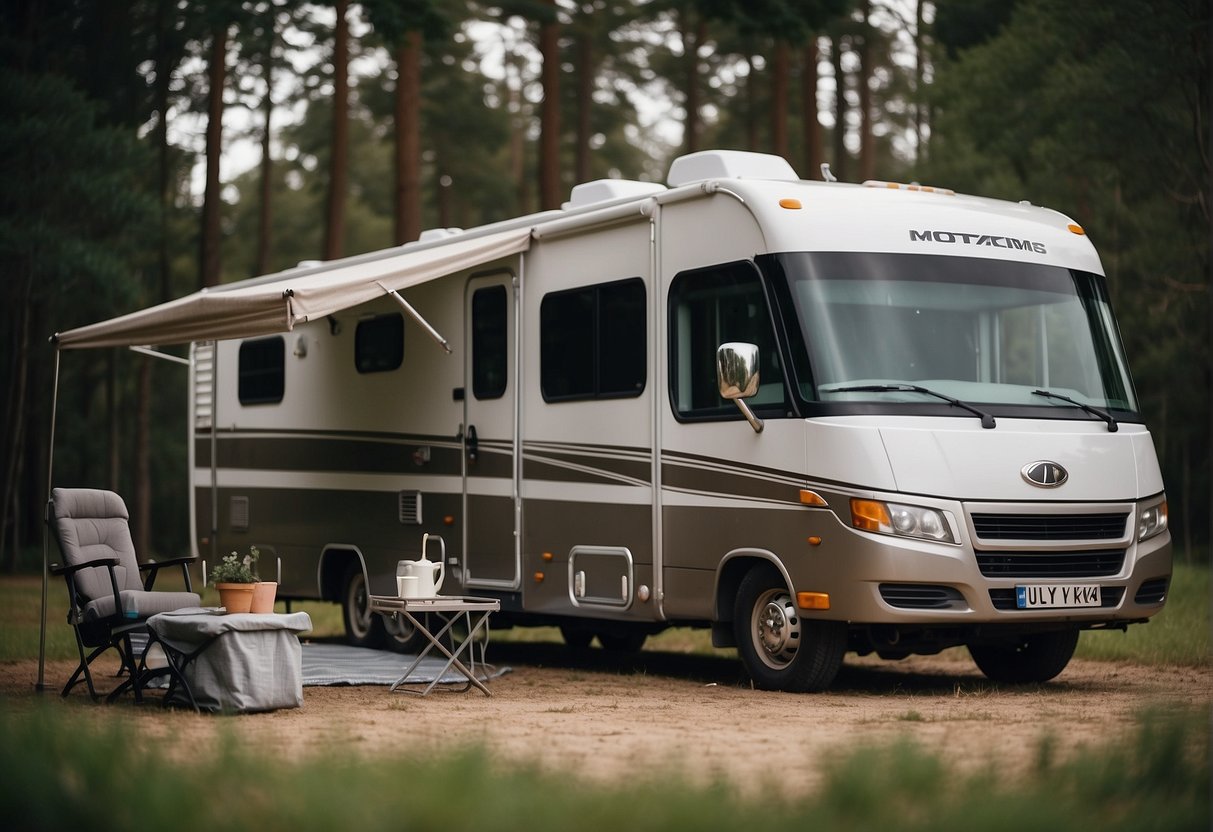Venturing into the motorhome lifestyle is both exciting and complex, much like setting sail on terra firma. As I’ve learned through my own travels, the key to a streamlined and enjoyable journey resides in equipping my RV with the necessary essentials. These are not just items that add comfort, but those that are critical for the functionality and maintenance of the motorhome. From items that ensure my vehicle’s safety to those that provide for my daily living needs, the goal is to have a motorhome that feels like a home on wheels without being weighed down by superfluous accessories.
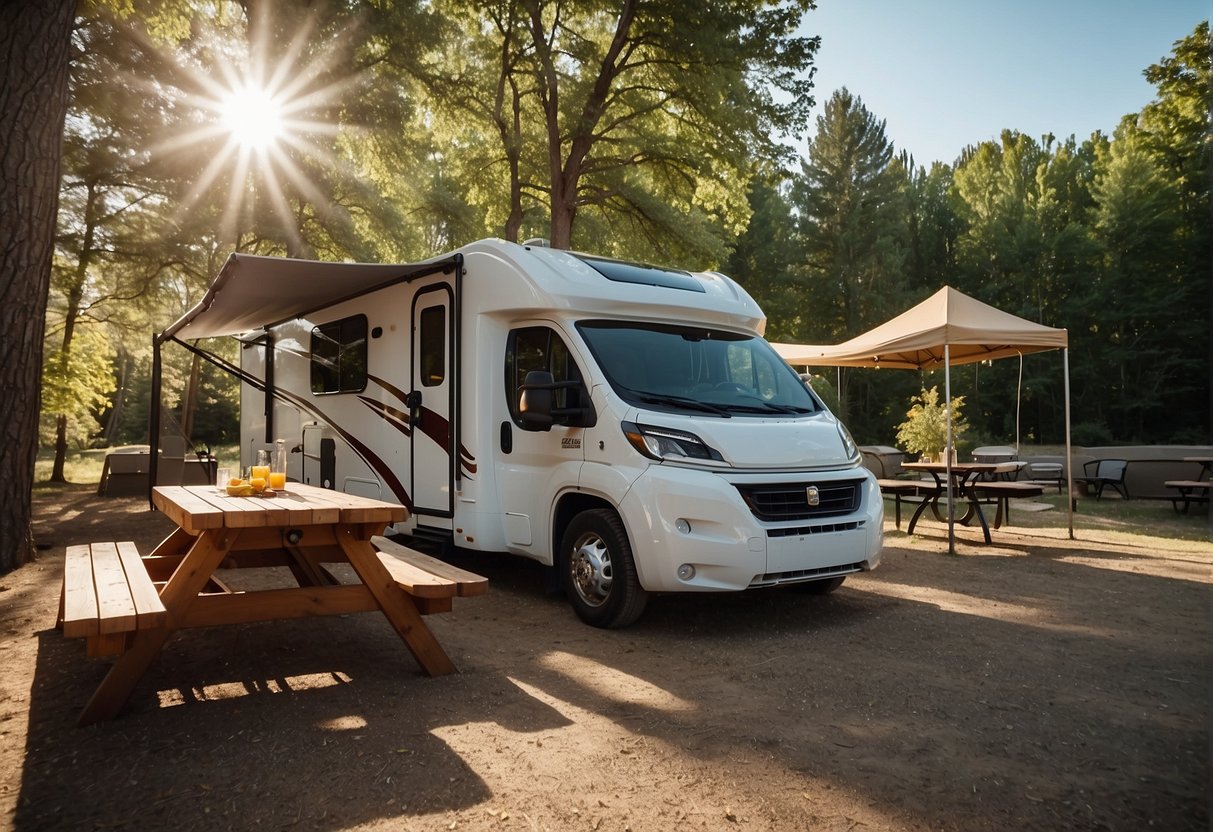
In preparing for life on the road, I have identified several categories of motorhome essentials that address virtually all aspects of the travel experience. It’s important to consider practical utilities and appliances that will reliably service the RV, and also focus on organizational tools that make the best use of limited space. There’s a balance to strike between comfort and convenience, ensuring that while I have a compact living space, it remains a sanctuary during long travels. Diving into the realms of safety, security, entertainment, navigation, and even customization, every detail contributes to a voyage that’s as hassle-free as possible.
Key Takeaways
- Equipping my RV with essentials enhances comfort and ensures functionality during travels.
- I focus on a balance of safety, practicality, and entertainment to enrich my motorhome experience.
- Effective organization and the right appliances are critical for maintaining an efficient living space.
Choosing Your Motorhome
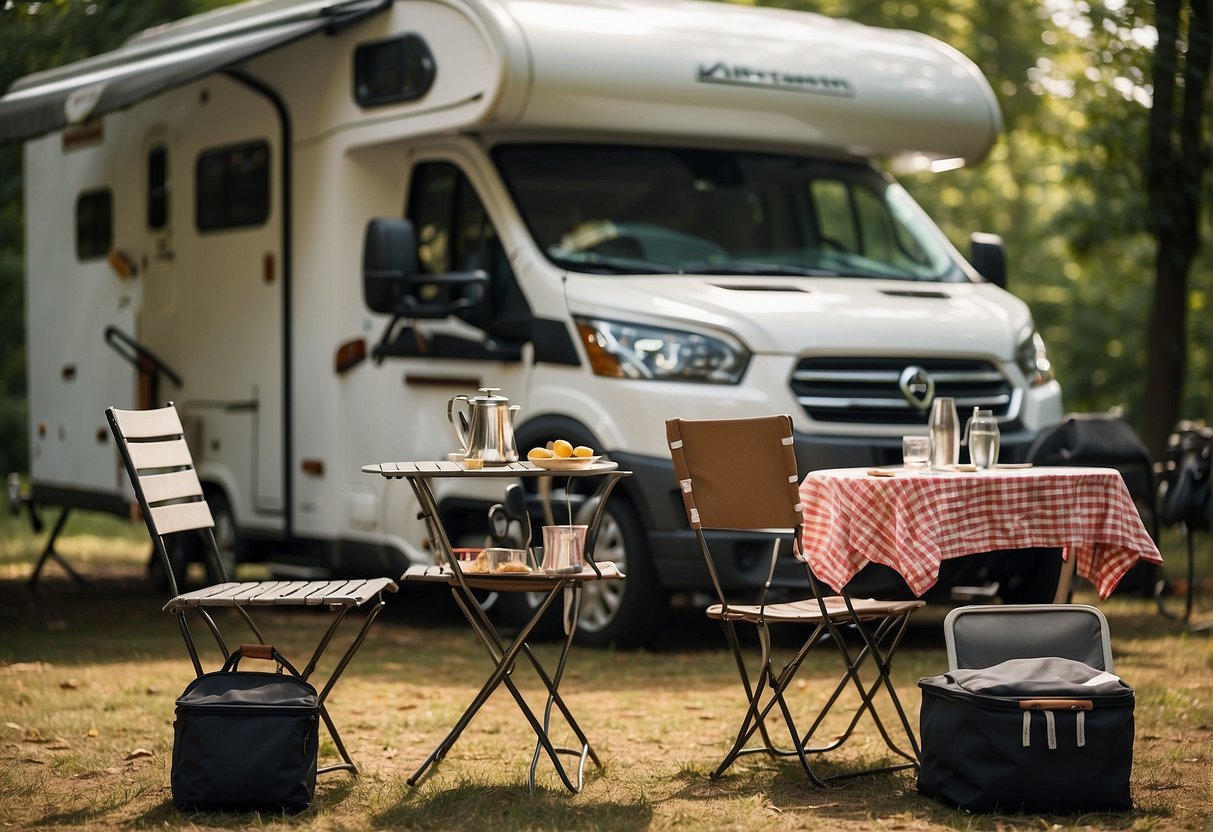
When I started my journey as a motorhome owner, the array of choices was overwhelming. My experience has taught me that selecting the right motorhome for your needs is crucial for ensuring a fulfilling journey. Here are some factors I focused on:
Size and Layout
Consider how many people will be traveling with you. In my search, I prioritized a layout that offered both comfort and practicality, which meant ample sleeping space and a functional kitchen. Motorhomes vary greatly in size, so it’s important to find a balance between interior space and drivability.
Budget
Motorhome prices can escalate quickly, so establishing a budget beforehand was essential for me. I always remind fellow motorhome beginners to factor in the additional costs such as maintenance, insurance, and fuel.
Usage
I reflected on how frequently and where I’d be traveling. For an occasional motorhome trip, a simple model might suffice, but for long-term traveling or varied climates, a motorhome with advanced features is advisable.
Reviews
Reading reviews from other motorhome owners provided me with insightful information that I couldn’t get from just viewing the motorhome. It’s a way to gauge long-term satisfaction and potential issues that might not be apparent during a first impression.
New vs. Used
A new motorhome was enticing with its unused features and warranties, but used motorhomes presented a more affordable option. I considered both, ensuring that a used vehicle had a thorough inspection and maintenance records.
To summarize, choosing a motorhome is a personal decision that should be made with careful consideration of your intended usage, budget, and preferences. By doing so, you can embark on your motorhome adventures with confidence and peace of mind.
Motorhome Basics
When setting out in a motorhome, there are some foundational aspects you must be familiar with, such as driving dynamics and routine maintenance. These basics ensure safety and longevity on the road.
Driving and Maneuvering
I’ve found that controlling a motorhome requires a different approach than driving a regular vehicle, primarily due to its size and weight. Firstly, always check that your mirror protectors are securely in place to prevent any damage to your side mirrors, which are essential for visibility. I also recommend installing a motorhome reversing camera; it’s been invaluable for reversing and parking maneuvers. Ensure that you have a fire extinguisher accessible from the driver’s area, along with a warning triangle in case of roadside emergencies.
Maintenance
Regular maintenance is the key to a hassle-free motorhome experience. In my toolkit, I keep a set of tools tailored to the specific needs of my motorhome. It’s wise to carry spare parts like fuses and light bulbs, a tyre repair kit for unexpected punctures, and a first aid kit for personal emergencies. Monitor your gas bottle levels and have a plan for refills to ensure you’re never without heat or a way to cook. Regular checks and understanding how to troubleshoot minor issues will save time and money.
Safety and Security
Safety and security are paramount when traveling in a motorhome. Having the right equipment on hand for emergencies and taking steps to secure my vehicle can provide peace of mind and potentially life-saving interventions.
Emergency Preparedness
Emergency Kit: I ensure my motorhome is equipped with a comprehensive emergency kit that includes, but is not limited to, items such as:
- Bandages
- Antiseptic wipes
- Emergency blankets
- Water purification tablets
For fire emergencies, I carry a fire blanket which is essential for extinguishing small blazes, particularly in the confined spaces of a motorhome.
Smoke Alarms and Carbon Monoxide Detectors: To detect the presence of smoke or harmful gases, I install smoke alarms and carbon monoxide detectors in my living and sleeping areas. I regularly check their batteries and functionality to ensure they’re operational should they be needed.
Securing Your Vehicle
Security Measures: I take my motorhome’s security seriously and have implemented several measures to deter theft and unauthorized entry. These include:
- High-quality locks on all doors and storage compartments.
- Motion-sensing exterior lights to illuminate the area around the motorhome at night.
Additionally, I use a steering wheel lock as a visible theft deterrent and an added layer of security when the vehicle is parked. Maintaining vigilance and being aware of my surroundings also plays a crucial role in securing my vehicle against potential threats.
Comfort and Convenience
In my motorhome journeys, I’ve come to understand that true relaxation stems from thoughtful preparation, especially when it concerns the details of bedding, food storage, and sanitation. Ensuring that these aspects are well-handled can dramatically enhance the comfort and convenience of life on the road.
Bedding and Sleeping
Proper bedding is essential for a good night’s sleep. I choose high-quality, soft sheets that snugly fit the motorhome’s mattress, plus a comfortable, warm quilt or sleeping bag suitable for variable temperatures. Don’t forget supportive pillows for added comfort. Extra blankets should be accessible for colder nights. Storage for shoes and clothing is important, too. I prefer using vacuum-sealed bags to save space and keep clothes fresh.
- Towels: I ensure I have at least two bath towels per person and a few hand towels.
- Toiletries: A well-organized toiletry kit makes daily routines smoother.
Cooking and Food Storage
For a kitchen that functions as efficiently as my one at home, I ensure my motorhome is equipped with vital appliances and utensils. A robust fridge preserves fresh produce, while a simple kettle is always ready for a hot beverage. Durable cutlery, dishes, and knives are selected for their multi-functionality. My cooking utensils must withstand the test of daily use.
- Fridge: Choose an energy-efficient model that fits your space requirements.
- Kettle: An electric or stovetop kettle is essential for boiling water.
Sanitation
Maintaining sanitation is non-negotiable for a comfortable experience. My bathroom is stocked with ample toilet paper designed for RV use and the necessary toilet chemicals to keep the system running smoothly. For reliable water supply, a quality water hose is necessary, and doubly so are sturdly sewer hoses for waste management. I make sure these are easily accessible and frequently checked for leaks.
- Toilet Paper: Stock up on RV-specific toilet paper that dissolves quickly.
- Sewer Hoses: Invest in high-quality hoses to avoid leaks and spillage.
Utilities and Appliances
In my motorhome travels, I’ve found that maintaining the proper function of utilities and appliances is crucial. It keeps the journey smooth and ensures all the comforts of home are at hand.
Water and Plumbing
My motorhome’s plumbing system is a top priority, as it directly affects my access to clean water. A reliable water pressure regulator helps to protect the vehicle’s pipes from high pressure at campgrounds. For drinking water, I have a trusted water filter that eliminates contaminants. I also carry a length of food-grade hose, preferably around 15 meters, that is crucial when I need to fill the fresh water tank. I’ve learned it’s wise to keep a water carrier for convenient transport and a fresh water tank cleaner to ensure tank hygiene and prevent any unwanted taste or odor.
Electrical and Power
Managing the motorhome’s power system means ensuring I don’t get caught off guard without electricity. My toolkit includes a robust electric cable to connect with external power sources at campsites. I rely on a generator for electricity off the grid, and I’ve invested in quality rechargeable batteries to power devices without the need to run the generator constantly. Levelling ramps are essential for when the motorhome is stationary; they ensure that my appliances, such as a portable washing machine, function effectively on level ground.
Heating and Cooling
To cope with varying climates, my motorhome is equipped to handle both heating and cooling needs. A propane system fuels my heating during colder months, while a well-maintained air conditioning unit keeps things cool in the heat. Having a stock of extra propane is necessary for peace of mind, ensuring that I won’t run out of fuel when I need it most.
In my experience, these utility and appliance considerations are non-negotiable for a functional and comfortable motorhome experience.
Entertainment and Leisure
When I’m on the road in my motorhome, I’ve found that having the right blend of entertainment and leisure activities can transform a good trip into a great one. I carefully select items that offer both relaxation and adventure, ensuring my experiences are as rich and engaging as possible.
Indoor Entertainment
For those rainy days or cozy evenings inside, books and shows are my go-to for indoor entertainment. I keep a well-stocked Kindle because it saves space and can store thousands of books. For shows, I ensure that my favorite streaming apps are updated on my tablet; this way, I can catch up on the latest series or a classic movie without needing a physical DVD collection.
- Books: E-books on Kindle
- Streaming Apps: Tablet with Netflix, Hulu, etc.
Outdoor Recreation
Embracing the great outdoors is part of what makes motorhome living so special. I always pack my collapsible kayak for some water exploration; it’s lightweight and easy to store. To cook up a delicious meal, my Blackstone portable grill is indispensable—it’s convenient for grilling anywhere. When darkness falls, I rely on my headlamps to navigate around the campsite safely. And for those who love traditional camping, having extra-strong tent pegs ensures your tent stays secure against the elements, even when I want to sleep under the stars for a night.
- Kayak: Collapsible and easy to store
- Cooking: Blackstone portable grill for grilling
- Lighting: Headlamps for safe navigation
- Tent Pegs: Extra-strong for securing tents
Packing and Organization
When packing for a motorhome adventure, effective space management and the use of comprehensive checklists are fundamental to ensuring nothing essential is left behind and that I maximize the available space.
Space Management
I’ve discovered that utilizing every inch effectively is key. I recommend using collapsible containers and multi-functional furniture to save space. Items like folding chairs and tables or a collapsible laundry bag work wonders. Designating specific spots for frequently used items prevents clutter. I also make sure to utilize vertical space with hanging organizers or stackable shelves. Mud mats are essential outside the motorhome to minimize the amount of dirt brought inside.
- Containers: Collapsible/foldable for space-saving
- Furniture: Choose multi-functional (e.g., storage ottomans)
- Laundry: Use a collapsible laundry bag to manage clothes
- Mud Mats: Place outside to keep the interior clean
Checklists and Reminders
To keep track, I rely on detailed motorhome checklists. I’ve personalized my own motorhome packing list, which I revise and update as necessary. A departure checklist is crucial — it ensures that nothing is overlooked before hitting the road. Transparent, labeled containers help me identify contents at a glance, streamlining the process.
- Motorhome Packing List: Update regularly with essentials
- Motorhome Departure Checklist: For final checks pre-trip
- Labeled Containers: For easy identification of contents
By sticking to these strategies in my motorhome experiences, I find that not only do I optimize the space, but I also alleviate the stress that often comes with packing and organization.
Navigation and Travel Tips
When I hit the road in my motorhome, I’ve found that success is all about having the right navigation tools and travel tips at my fingertips. From selecting the optimal route to ensuring I’m always connected, here’s how I make my RV adventures both memorable and smooth.
Route Planning
Before I embark on any journey, my first step is always meticulous route planning. I rely on a high-quality sat nav system designed for RVs which accounts for vehicle size and weight, helping me avoid roads that aren’t motorhome-friendly. Additionally, I frequently check a road trip website or consult a motorhome travel blog for insights on scenic paths and RV-friendly amenities. These resources often provide me with the hidden gems of travel, turning a simple drive into an adventure.
- Tools I Use for Route Planning:
- Sat Nav: For real-time traffic updates and route alterations.
- Maps and Guides: They’re great backups in areas with poor signal.
- Online Communities: For personal anecdotes and route suggestions from experienced RVers.
Tech and Connectivity
Staying connected is crucial for both safety and enjoyment while RV camping. I always pack a mobile hotspot to keep my tech powered and ensure I can access my digital resources. This setup is integral for navigating remote areas where my phone signal may falter. Moreover, having a reliable internet connection allows me to stay in touch with fellow RVers and update my plans on the fly, embracing the true spirit of adventure by adapting to new opportunities as they arise.
- Connectivity Checklist:
- Mobile Hotspot: Essential for a stable and secure internet connection.
- Chargers and Adaptors: To keep devices powered up at all times.
- Apps: I’ve got an arsenal of apps for weather, navigation, and local RV services.
By taking advantage of digital tools and resources, I ensure my motorhome travels are as seamless as they are exciting. Whether I’m planning a route or staying connected, it’s all about having the right tech by my side.
Additional Gear and Accessories
In my experience of motorhome travel, having the right additional gear and accessories can make the journey smooth and enjoyable. From outdoor essentials that enhance the camping experience to maintenance tools crucial for the vehicle’s upkeep, there are specific items I recommend every motorhome owner should carry.
Outdoor Gear
When setting up camp, I insist on using levelling chocks to ensure my motorhome is perfectly horizontal; this affects everything from sleep quality to the operation of appliances. A hose pipe is necessary to maintain a fresh water supply, and I suggest a food-grade hose for safety. Never overlook the importance of a rope, which comes in handy for securing items or even makeshift repairs. I always pack wheel chocks for extra vehicle stability, especially on uneven terrain.
- Levelling chocks: Essential for a flat, stable resting motorhome.
- Hose pipe: Preferably food-grade, minimum 10-15m length.
- Rope: Versatile for securing gear or emergency fixes.
- Wheel chocks: For additional safety and stability.
Maintenance Tools
I’ve learned that having a set of maintenance tools on board can save the day. A sturdy hammer is a must for driving in stakes or quick fixes. It’s equally important to keep various nuts and bolts for replacing any that may come loose. My toolkit isn’t complete without a microfibre towel, which is excellent for cleaning delicate surfaces without scratching. And while not a tool, I always carry painkillers, as they’re essential for dealing with headaches or minor pains.
- Hammer: A multipurpose tool for quick fixes.
- Microfibre towel: For scratch-free cleaning.
- Nuts and bolts: Handy replacements for loose fixtures.
- Painkillers: An essential part of any first aid kit.
Frequently Asked Questions
In my experience with motorhomes, certain questions frequently arise among new and seasoned RVers alike. Here are some of the crucial answers that’ll help ensure you’re well-prepared for your adventures.
What are the must-have items for a new luxury motorhome?
For a new luxury motorhome, it’s essential to include items that enhance comfort and functionality. This includes high-quality bedding, a GPS tailored for RVs, solar panels for off-grid power, and a reliable Wi-Fi booster to stay connected.
Which essentials should I consider when purchasing a used motorhome?
When buying a used motorhome, prioritize essentials that might need replacement or upgrading. These include new tires, a refurbished water system, and updated safety equipment like smoke detectors and fire extinguishers. Also, consider the age and condition of the batteries and the motorhome’s overall maintenance records.
What is included in a comprehensive motorhome essentials checklist?
A comprehensive motorhome essentials checklist includes items for proper functionality and comfort, such as a sanitation hose, RV-specific toilet paper, leveling blocks, fresh water hoses, and a toolkit for on-the-go repairs. Additionally, kitchen utensils, a first-aid kit, and comfortable outdoor furniture should also be considered.
How should I effectively pack for an upcoming motorhome trip?
To pack effectively for a motorhome trip, I categorize items by use and frequency of use. I ensure that daily necessities are easily accessible. Collapsible containers and space-saving organizers are also invaluable for maximizing storage without cluttering living spaces.
What accessories are most important for a motorhome travel kit?
The most important accessories for a motorhome travel kit include a comprehensive toolset, an emergency road kit, and a portable tire inflator. Additionally, incorporating a multi-purpose weather radio and a backup camera can markedly improve safety on the road.
As a beginner, what are the essential items I need for my RV?
As a beginner, the essential items you need for your RV cover basic repairs, safety, and comfort. This means having a reliable leveling system, wheel chocks, a sewer kit, potable water hose, and a surge protector. Also, don’t forget the essentials for daily living, such as cookware, linens, and personal toiletries.
